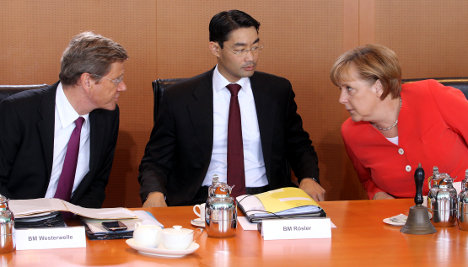The proposed 2012 budget expects the government’s borrowing needs to drop €4 billion compared to previous projections, due to the booming economy boosting tax revenues. The annual budget deficit is forecast to shrink to €14.7 billion by 2015.
But Berlin’s budgetary consolidation will be slowed by the establishment of the EU’s permanent eurozone rescue fund, which will burden Germany with €4.3 billion starting in 2013.
The cabinet also backed the centre-right coalition’s intention to cut taxes and lower social security contributions starting that same year. Although the cuts are meant to target taxpayers in lower and middle brackets, final details will only be firmed up after parliament’s summer recess.
“Budgetary consolidation and lowering the tax burden are two sides of the same coin,” said Economy Minister Philipp Rösler after the cabinet meeting. “That’s how we create the foundation for a sustainable upswing.”
Rösler’s pro-business Free Democratic Party (FDP) is known for its tax-cutting zeal and many observers believe Chancellor Merkel agreed to the fiscal plans in a bid to boost the fortunes of her junior coalition partners ahead of a general election in autumn 2013.
But not all of Merkel’s conservatives are pleased by the proposed cuts.
The budgetary spokesman for her Christian Democrats (CDU) in parliament, Norbert Barthle, said on Wednesday there was “currently no wiggle room” for new expenditures or decreased revenues.
And Finance Minister Wolfgang Schäuble’s budgetary planning at present does not account for potential gaps in funding.
The CDU’s Schäuble recently irked the FDP by suggesting they come up with spending cuts to cover the cost of any lowering of taxes.
DAPD/The Local/mry



 Please whitelist us to continue reading.
Please whitelist us to continue reading.
Member comments